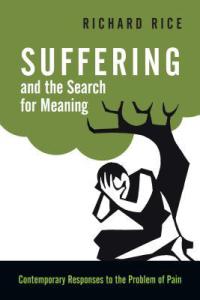
Suffering and the Search for Meaning: Contemporary Responses to the Problem of Pain. Richard Rice (Downers Grove, IL: InterVarsity Press, 2014).
Summary: This book surveys seven different approaches to the question of why pain and suffering if there is a God. This serves both as an introduction to the subject of theodicy and provides pastoral and personal resources for responding to people in pain, including one’s own suffering.
Suffering raises profound questions for every human being. For the Christian or other theists, it raises the question of how we are to understand a good and powerful God allowing evil and suffering. But even for the atheist, who can only say that suffering is, there is still the profound sense of the “wrongness” of suffering and why one thinks it wrong. Then there are the times where suffering becomes real in our lives, or for someone who we care deeply. At times, the numbness, or the outrage of suffering leaves one thinking no answers make sense. Yet few of us wish to live our lives believing it is really all senseless. We try to make some sense out of suffering, or are in the position of walking along others as they make their own sense out of it.
This is a book for those times. What the author does is survey seven approaches to this question that have helped Christians over time. The approaches are:
- Perfect plan theodicy: that all suffering is a part of God’s perfect plan
- Free will defense: that suffering is a result of human free will used badly.
- Soul-making theodicy: this approach finds meaning in how suffering changes us for the better.
- Cosmic conflict theodicy: this approach recognizes the role of the devil in directly or indirectly causing suffering.
- Openness of God theodicy: God doesn’t foreknow the choices we make, only the possibilities, but how we actually exercise free will is only known to God when we act. This approach has much in common with the free will approach.
- Finite God theodicy: God is not all powerful, the “when bad things happen to good people” approach.
- Protest theodicies: These are expressions of outrage against terrible evil claiming no God could permit such evil.
For each approach Richard Rice outlines the basic contours of that approach, why it is attractive as a response to the question of suffering, and what the drawbacks of the approach are.
His concluding chapter, titled “Fragments of Meaning” explores how one uses this material to help the suffering, whether the suffering is “theirs” “ours” or “yours”. Each is a unique situation with unique pastoral requirements. He suggests that in formulating our own theodicy the twin questions of What kind of world did God create? and What kind of God created the world? are key to the theodicy we form. Rice would suggest that most will form a bricolage, an understanding drawn from the fragments of different theodicies rather than favoring only one. For the author (who favors open theism but evenhandedly presents each view) his own bricolage consists of these four statements:
- God is Lord and God is Love.
- Suffering is real and suffering is wrong.
- God is with us when we suffer
- Suffering never has the last word.
What I most appreciated about this book was the conciseness and clarity of explanation of the different views as well the pastoral sensitivity that realizes that these are not “answers” we give, but resources on which we draw as we try to make sense out of our own suffering or walk alongside others. For those looking for the “right” answer, this is not the book, but as the author observes, in Job, even God does not really “answer” Job.
Editor’s Note: Thank-you to Bob Trube for sharing his reviews with Emerging Scholars! Bob first posted the above review on Bob on Books. ~ Thomas B. Grosh IV, Associate Director, Emerging Scholars Network
Bob Trube is a former Associate Director of Faculty Ministry and Director of the Emerging Scholars Network. He blogs on books regularly at bobonbooks.com. He resides in Columbus, Ohio, with Marilyn and enjoys reading, gardening, choral singing, and plein air painting.

I really appreciate the “bricolage” you shared in this post. It provides timely reminder for me as my family goes through a hard time. Thank you.
Thanks, Jon. I greatly appreciated Rice’s book and his suggestion of this idea. I don’t think the book has received the attention it deserves–it was one of my ‘best reads’ of 2015.